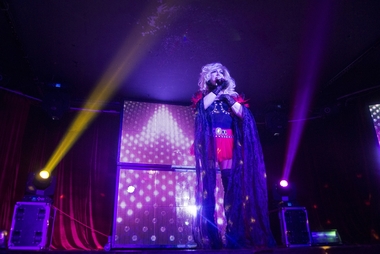What would the re-election of Vladimir Putin mean for the LGBT community in Russia?

YEKATERINBURG, Russia (AP) — From the stage of a gay nightclub, a performer in drag reminded those in the crowd of their civic duty as Russians.
"Do you know what's happening tomorrow?" asked Andrei. "I'm going to the election tomorrow. If anyone wants to join me, I can lend you my makeup, we'll go together."
The 30-year-old appeared to be the only person at the club in this industrial city 1,400 kilometers (870 miles) east of Moscow who was enthusiastic — even if in a joking way — about voting Sunday and what the re-election of President Vladimir Putin would mean for the LGBT community in Russia.
As he put on his makeup before the show, Andrei was asked what he expects the next six years would be like.
He echoed Putin's mantra: "Some kind of stability."
In 2013, Putin signed legislation that banned "propaganda of nontraditional sexual relations among minors," making it a crime to hold gay rights rallies or to openly discuss homosexuality in content accessible to children.
In reality, that has meant a "don't-ask-don't-tell" agreement of sorts with the state. Before the collapse of the Soviet Union in 1991, homosexuality could be punished by up to five years in prison.
While some of the men said they never found acceptance in their families, they insisted that they can be safe as long as they are discreet. The performers interviewed at the club would not give their last names because they had day jobs elsewhere and feared repercussions.
Markus, 26, left home in his early teens after dropping out of a military boarding school. For him, as for the other performers, going onto the streets of Russia's fourth-largest city in drag is out of the question.

"I can't just put on the heels and walk the streets," he said. "My upbringing won't allow it. I'm just an ordinary man like everyone else except for my sexual orientation, but I shouldn't be telling everyone about it. It's my private business."
Markus added: "If you don't put it on display, if you don't show off, it's OK."
A year ago, reports began emerging from the predominantly Muslim republic of Chechnya in southern Russia that men were tortured and killed on the mere suspicion of being gay.
A government investigation found no proof to back the accounts of dozens who spoke about torture at secret prison facilities overseen by the allies of Chechen leader Ramzan Kadyrov. He has claimed there are no gays in Chechnya.
For the LGBT community in Yekaterinburg, those horror stories seem like something from a foreign country — unconceivable in this city in the Ural mountains.
Among the performers at the Fame nightclub, Andrei was the only one who said he would vote, although he refused to say for whom. One of the veteran performers, 51-year-old Gera, said he has never voted because he has "neither confidence nor faith" in elections, and Markus also said it was pointless.
Markus said he does not hold a grudge against Putin for monopolizing power. Like many Russians, he credited him for bringing stability despite worsening relations with the West.
"Compared to the Soviet Union and the 1990s when there were gangs, life is much easier now," he said.
The era when some of Yekaterinburg's neighborhoods were outdoor drug dens at night may be gone, but security at Fame illustrated the lingering jitters in the gay community. Three men at the entrance searched patrons' belongings at the metal detector more meticulously than security officials at some Russian airports.
Most of the patrons did not want to be photographed or interviewed, saying they feared repercussions from neighbors or colleagues.
Zakhar Naumov, a 32-year-old marketing manager at a flower company, said he could understand the need for heightened security. He was beaten by guards at a club hosting a gay party in 2008 "because I was walking out of their club, holding someone by the hand."
Unlike most victims of anti-gay violence that largely goes unreported in Russia, Naumov went to the police and filed charges. His attackers were given brief prison sentences.
Naumov said another six years of Putin is "going to be the same as before," with gays opening up about their sexuality only to immediate family members or at clubs.
"It's like they exist, but at the same time, it's as if they don't," he said.
But he draws hope from a younger generation that appears to be far more accepting of gays than people who grew up in the Soviet Union. Attitudes won't change until the government is "as young as we are."
Naumov said he would vote — but only to spoil his ballot, "because there is no choice, no choice at all."
Copyright Associated Press, all rights reserved.
The Gayly. March 18, 2018. 11:50 a.m. CST.





